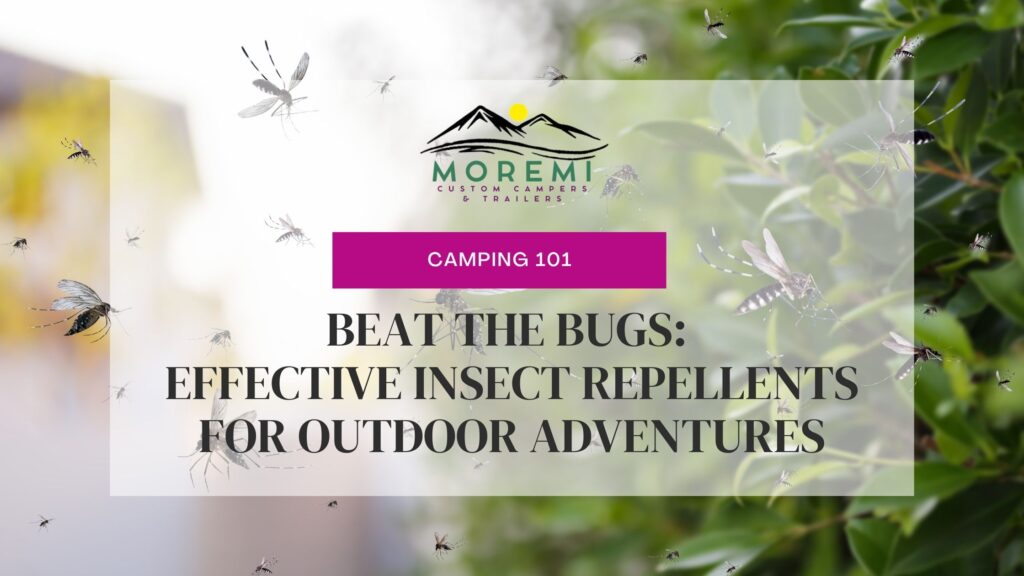Camping in South Africa offers breathtaking landscapes and diverse ecosystems, but it also brings encounters with insects, particularly mosquitoes and flies. In some regions, especially near water bodies or in warmer climates, insects can be more than just a nuisance—they can carry diseases like malaria and West Nile virus. To ensure a comfortable and safe camping experience, it’s crucial to use effective insect repellents and follow strategies to avoid bug bites. Here’s how to protect yourself from insects while exploring South Africa’s great outdoors.
Recommended Insect Repellents
1. DEET-Based Repellents
DEET (N,N-Diethyl-meta-toluamide) is one of the most widely used and effective insect repellents. It works by interfering with the insects’ ability to detect humans. For prolonged outdoor exposure, choose a repellent with a DEET concentration of 30% to 50%. Higher concentrations provide longer-lasting protection but are generally suitable for intense insect activity. Popular DEET-based repellents include:
- Off! Deep Woods: Provides up to 8 hours of protection against mosquitoes and ticks.
- Repel 100 Insect Repellent: Offers up to 10 hours of protection with a high DEET concentration.
2. Picaridin-Based Repellents
Picaridin, also known as icaridin, is a newer alternative to DEET that is effective against mosquitoes, ticks, and other insects. It is less greasy and has a milder scent compared to DEET. Picaridin is a good choice for those who prefer a more pleasant application experience. Notable picaridin-based repellents include:
- Sawyer Products Premium Insect Repellent: Offers up to 12 hours of protection.
- Cutter Advanced: Provides up to 8 hours of protection with a 15% picaridin concentration.
3. Oil of Lemon Eucalyptus
Oil of lemon eucalyptus (OLE) is a natural insect repellent that has been shown to be effective against mosquitoes. It provides protection comparable to low concentrations of DEET. For those seeking a more natural option, OLE is a great choice. Recommended products include:
- Repel Lemon Eucalyptus: Offers up to 6 hours of protection and is DEET-free.
- Mosi-Guard Natural Insect Repellent: Contains 30% OLE and provides effective protection.
4. Citronella-Based Repellents
Citronella, derived from lemongrass, is a popular natural repellent often used in candles, sprays, and lotions. While effective, citronella may need to be reapplied more frequently than other types of repellents. It is best used in combination with other protective measures. Consider products like:
- Off! Citronella Candle: Useful for repelling insects around your campsite.
- Natrapel Lemon Eucalyptus Insect Repellent: Contains citronella and other natural ingredients.
Strategies to Avoid Bug Bites
1. Wear Protective Clothing
- Long Sleeves and Pants: Wear long-sleeved shirts and long pants to reduce exposed skin. Light-coloured clothing is less attractive to mosquitoes and easier to spot insects on.
- Insect-Repellent Clothing: Consider wearing clothing treated with insect repellent, which can provide an extra layer of protection, particularly in high-infestation areas.
2. Use Mosquito Nets
- Bed Nets: When sleeping outdoors, use a mosquito net over your sleeping area to keep bugs at bay. Ensure the net is properly tucked in to prevent insects from entering.
3. Avoid Peak Mosquito Hours
- Dawn and Dusk: Mosquitoes are most active during dawn and dusk. If possible, limit outdoor activities during these times or take extra precautions.
4. Eliminate Standing Water
- Camp Site Management: Mosquitoes breed in standing water. Keep your campsite free of stagnant water by regularly emptying containers and ensuring proper drainage.
5. Apply Repellent Regularly
- Frequent Reapplication: Even with the best repellents, reapply every 2 to 4 hours, or as directed on the product label, especially if sweating or after swimming.
Final Thoughts
Insect repellent is a vital component of your camping gear when exploring South Africa’s natural beauty. By choosing effective repellents and following practical strategies to avoid bug bites, you can enhance your outdoor experience and protect yourself from potential insect-borne diseases. With these tips, you’ll be able to enjoy your adventure while staying comfortable and bug-free.

